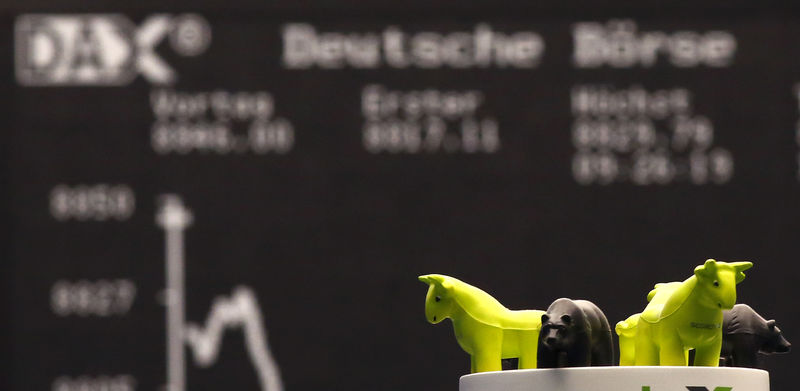Investing.com - European stock markets traded lower Thursday on growing worries around China’s stuttering economy and the potential for higher U.S. interest rates.
At 03:50 ET (07:50 GMT), the DAX index in Germany traded 0.6% lower, the CAC 40 in France dropped 0.6%, while the FTSE 100 in the U.K. traded 0.5% lower.
Fed minutes offer hawkish slant
The minutes of the Fed’s July meeting showed a number of officials still saw the need for more interest rate hikes to combat still elevated inflation levels, potentially weighing on economic activity in the world’s largest economy, a major global growth driver.
“Most participants continued to see significant upside risks to inflation, which could require further tightening of monetary policy,” according to minutes published Wednesday in Washington.
Additionally, the July Fed meeting came before a raft of U.S. data that underscored the resilient economy.
Fitch may look at downgrading China’s rating
Adding to the negative sentiment was the news that rating agency Fitch Ratings may consider rethinking China’s A+ sovereign credit rating, especially if corporate debt conditions worsen and the government expands its balance sheet to support the companies.
This comes amid fresh concerns about the country’s property sector, which have contributed towards Chinese economic growth slowing sharply in the second quarter of 2023.
Gloomy European economic outlook
Back in Europe, the economic outlook is downcast, as evidenced by Dutch government policy adviser CPB predicting economic growth in the Netherlands will be much slower than earlier expected this year, as a recession in the first half of 2023 ended a strong post-COVID-19 boom.
Eurozone gross domestic product rose 0.3% in the second quarter, the EU's statistics agency said Wednesday, but underlying growth was probably weaker, as the data was distorted by a 3.3% jump in Irish GDP, which is driven by the oversized impact of big foreign companies based there for tax reasons.
BAE Systems slips on acquisition news
In corporate news, BAE Systems (LON:BAES) stock fell 3.3% after Britain's largest defence company said it agreed to buy Ball Corp's (NYSE:BALL) aerospace assets for about $5.55 billion in cash.
GN Store Nord (CSE:GN) stock slumped 11% after the Danish hearing aid manufacturer talked of "challenging market conditions", while Aegon (AS:AEGN) stock fell 4.6% after the Dutch financial services company reported a first-half net loss.
On the flip side, Philips (AS:PHG) stock rose 3.5%, with the Dutch healthcare technology group continuing to benefit from the news earlier this week that Exor, the investment arm of Italy's Agnelli family, has become the top investor by buying 15%.
Crude slips as U.S. production hit three-year high
Oil prices edged higher Thursday, rebounding from two-week lows, helped by a bigger-than-expected draw in U.S. inventories.
However, sentiment remains weak given worries slowing growth in China and a continued hawkish stance from the Federal Reserve will weaken fuel demand in the world's two biggest economies.
Additionally, data from the Energy Information Administration showed that U.S. production hit a new three-year high last week, close to the record-high levels produced before the COVID-19 outbreak in 2020.
By 03:50 ET, the U.S. crude futures traded 0.4% higher at $79.72 a barrel, while the Brent contract climbed 0.5% to $83.83. Both contracts earlier hit their weakest level in two weeks.
Additionally, gold futures fell 0.2% to $1,925.35/oz, while EUR/USD traded 0.1% higher at 1.0878.
